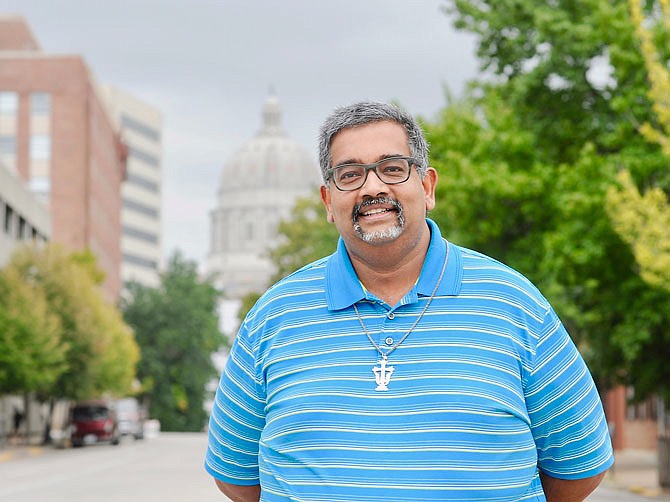Inclusiveness was at the heart of a division in the Jefferson City's Central United Church of Christ, people who left the congregation said.
The rift in the church had been in the works for months, said the Rev. Rushan Sinnaduray, former pastor at Central United Church of Christ.
"In April, there was a split," Sinnaduray said. "I and a group of people left."
Those who departed the church created a new church - The Oasis United Church of Christ. The church received recognition July 29 as a member of Missouri's Mid-South Conference of the United Church of Christ. At the same time, the UCC designated it as Open and Affirming (ONA), a UCC designation meaning it is a congregation welcoming people of all sexual orientations, gender identities and gender expressions.
The new congregation recognizes Jefferson City is a mostly conservative community, Sinnaduray said. But it also understands it is not entirely conservative.
"I believe the ONA was one of the drives behind the split," he said. "It opens a church up to be more responsive and inclusive of a variety of people."
The ONA designation was not something Central United Church of Christ's church council ever voted on, according to Warren Witt, its president.
"There are different theological opinions between those at Central church and those who decided to start Oasis," Witt said. "That's true for all churches."
He said the biggest difference between the two churches was the way the two sides interpreted the Bible - those who operate Central United Church of Christ prefer a more literal interpretation, and those who left were more progressive.
The ONA designation started with a focus on LGBTQ representation, Sinnaduray said, but expanded to include race, disabilities and gender. The majority of the steering committee for the new church are women, he said. They are the church's leaders.
He said diversity was not a strong suit of Central United Church of Christ.
"(Diversity) goes both ways," Witt said. "It means inclusive of everyone, whether they share more traditional theological beliefs or more progressive theological beliefs."
The group that broke away is passionate about reaching people who are frightened away by institutional churches, Sinnaduray said. It is not focused on immediately locating a brick-and-stone location, although it would not be opposed to a lease. One of its members owns New Horizons Community Support Services building at 2013 William St. That member is letting the church use space for its 10 a.m. Sunday services.
The Oasis held its first service July 1.
Church members "are keen on using their resources for mission," Sinnaduray said. "They are very focused on trying to live out the Gospel and using their resources for that."
They provided backpacks with school supplies for 48 children in Jefferson City. They also held a "welcome back" luncheon for teachers at Belair Elementary School.
More divisive than the ONA designation was what roles people played within Central United Church of Christ, Witt said. There were questions about who administers to the homebound, who administers to the sick and others, he said.
The new congregation intends to "reinvent what it means to be a church," Sinnaduray said. They don't want the church to concentrate on developing power or raising money, he said.
The Oasis is more progressive and takes a more liberal interpretation of the Bible, Witt said.
Sinnaduray also describes The Oasis' theology as progressive - meaning, he said, God is still speaking; it strives to be multicultural and multiracial; it invites questions; it's experimental and experiential; it uses diverse practices; anyone is welcome; it does not judge; it reads the Bible through lenses of reason, experience and tradition; and it follows Jesus, meaning love is at the center of everything it is and does.
"One of the arguments I think we've had at times was," he said, "Are we followers of Christ, or do we spend our time creating a 'Bless me' club?' We don't have that baggage and are moving forward."

